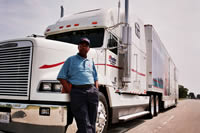
If you have an upcoming long-distance relocation, chances are you have a million questions to ask before getting started. Capital City Transfer, a reliable long-distance mover based out of Madison, has heard them all—in our 45+ years in business, we've executed countless cross-country moves, and know what you'll need to anticipate in order to allow moving day to go as smoothly as possible.
Below you'll find our list of top questions to ask potential moving and storage companies related to your long-distance relocation, and our best cross-country moving advice for anyone planning an interstate move!
Is Your Business Properly Licensed?
This should be the very first question you ask any potential moving and storage company. All long-distance movers should be registered with the FMCSA and have a number with the DoT, signaling they are a legitimate business offering professional services.
Are You Accredited by Known Organizations?
Aside from being formally registered, you'll still want to know what others have to say about the services offered by the moving company, and recognition with other well-known organizations can give you an idea of who you're hiring. Some green flags to look for include:
- BBB-Accreditation
- Angi's List Awards and Recognitions
- Membership with the American Trucking Association's Moving and Storage Conference
- Zero Complaints Against Mover on FMCSA Website
What Additional Services Do You Provide?
Maybe you still don't even know yourself what all you'll need on moving day, but it can be helpful to inquire about additional services to a potential mover. See if they have secure storage facilities where you can store items temporarily or permanently or check if they offer full-service packing options.
Can You Handle All Aspects of My Move?
Not all moving companies offer the same services, so you'll want to communicate any concerns you have around specialty items, like grand pianos or vehicles that need shipping. This can be a deciding factor for which company you enlist, because it could save you extra steps for relocating special items through another company after the fact.
What Insurance Coverage Can I Expect?
By law, interstate moving companies must provide liability protection at a rate of .60 cents per pound of damaged belongings, but many offer additional coverage that customers can opt-in for. Ask a mover about their full-valuation protection, and what sorts of repairs, replacements, and cash settlements they'll provide in the event of broken or lost items.
All long-distance movers must have an arbitration program, and it's a good idea to inquire about this as well. An arbitration program outlines how a moving company will handle disputes with customers outside of court and without lawyers.
Is My Relocation Estimate an Exact Cost?
There are two different types of estimates a moving company can provide, binding and non-binding, and you'll want to know which you've been given:
- Binding Estimates: These estimates are exact, and provide the amount you can expect to pay, unless you've added on additional services since the estimate was created.
- Non-Binding Estimates: Non-binding estimates are approximate, and the amount you'll actually pay could vary slightly from the number given on the estimate.
It's always a good idea to get a written estimate from your mover to reference later on if needed, and to clarify what type of estimate it is.
When Do I Need to Begin Planning My Move?
Because there are more pieces to the puzzle with long-distance relocations, you'll want to give yourself a generous moving timeline of at least six weeks. That's not factoring in the time it takes to find the right moving company though—plan on an additional two weeks to call around and get estimates from at least three different companies to find the area's most affordable long-distance movers.
How Much Should I Budget for a Cross-Country Move?
Long-distance relocations cost more than local ones and can run homeowners anywhere from $4,000 to $10,000 depending on factors like the amount of belongings being transported and the distance to your new address.
There are always ways to save money on long-distance moves, though! Some things to keep in mind are:
- The best time to move cross-country is between October and May, when companies can offer reduced, offseason rates.
- It can save money to downsize your belongings ahead of time to reduce the amount of goods being transported.
What's the Best Way to Pack for a Long-Distance Move?
We always recommend packing a moving day bag, filled with essential items you don't want to accidentally misplace during the hustle and bustle of packing everything into boxes. Set aside medications, important documents, and other items you know you'll need to have on hand.
Knowing how to pack for a long-distance move also requires making decisions on what to leave behind, which can include things like:
- Items You No Longer Need
- Perishable Food
- Oversized Furniture
- Plants
- Hazardous Materials
Do I Need to be at My House on Moving Day?
You should definitely plan on being present when your movers show up, as the entire process will become much more streamlined when you're there in-person to answer any questions, or voice your own. You'll also want to be present, if possible, at your new address when your belongings are being dropped off, so make sure you and your mover both are operating under the same delivery window timeline.
Not only is Capital City Transfer BBB-accredited and ProMover certified with the ATA MSC, but we're also agents of Wheaton World Wide Moving, a strong, nationwide moving network that will allow us to seamlessly relocate you and your belongings to any new address in the country, or even internationally.
Reach out to Capital City Transfer today to hear more about our long-distance moving tips, and we'll give you a free, no-obligation estimate on your exciting cross-country relocation!
Subscribe to Capital City Transfer Inc's Blog






Comments